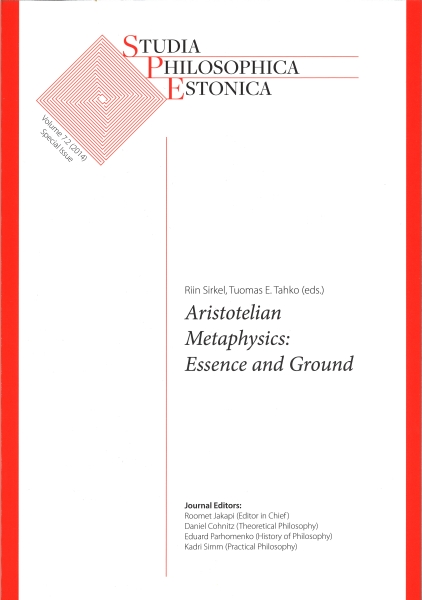Plato on Metaphysical Explanation: Does 'Participating' Mean Nothing?
DOI:
https://doi.org/10.12697/spe.2014.7.2.09Keywords:
participation, Plato, explanation, predication, paradigmAbstract
According to Aristotle, Plato's efforts at metaphysical explanation not only fail, they are nonsensical. In particular, Plato's appeals to Forms as metaphysically explanatory of the sensibles that participate in them is "empty talk" since "'participating' means nothing" (Met. 992a28-9). I defend Plato against Aristotle's charge by identifying a particular, substantive model of metaphysical predication as the favored model of Plato's late ontology. The model posits two basic metaphysical predication relations: self-predication and participation. In order to understand the participation relation, it is important first to understand how Plato's Forms are self-predicative paradigms. According to the favored model, Forms are self-predicative paradigms insofar as they are ideal, abstract encoders of structural essences. Sensibles participate in Forms by exemplifying the structures encoded in the Forms. Given plausible conditions on metaphysical explanation, Plato's appeals to abstract Forms as metaphysically explanatory of sensibles is a reasonable competitor for Aristotle's appeals to natural, substantial forms. At the very least, Plato's appeals to a participation relation are not empty.
Downloads
References
Allen, R. E. (1960). Participation and predication in Plato’s middle dialogues, The Philosophical Review 69: 147-164.
Beere, J. (2009). Doing and Being: An Interpretation of Aristotle’s Metaphysics Theta, Oxford University Press, Oxford.
Bolton, R. (1998). Plato’s discovery of metaphysics: The new Methodos of the Phaedo, in J. Gentzler (ed.), Method In Ancient Philosophy, Oxford University Press, Oxford, pp. 91-111.
Code, A. (1983). On the origins of some Aristotelian theses about predication, in J. Bogen and J. McGuire (eds), How Things Are, D. Reidel, Dordrecht, pp. 101-133.
Corkum, P. (2008). Ontological dependence in Aristotle, Phronesis 58: 65-92.
Devereux, D. (1994). Separation and immanence in Plato’s theory of Forms, Oxford Studies in Ancient Philosophy 12: 63-90.
Devereux, D. (2003). Plato: Metaphysics, in C. Shields (ed.), The Blackwell Guide to Ancient Philosophy, Blackwell Publishing Ltd, Oxford, pp. 75-99.
Evans, M. (2012). Lessons from Euthyphro 10a-11b, Oxford Studies in Ancient Philosophy 42: 1-38.
Ferejohn, M. (2013). Formal Causes: Definition, Explanation and Primacy in Socratic and Aristotelian Thought, Oxford University Press, Oxford.
Fine, G. (1984). Separation, Oxford Studies in Ancient Philosophy 2: 31-87.
Fine, G. (1986). Immanence, Oxford Studies in Ancient Philosophy 4: 71-97.
Fine, G. (1993). On Ideas, Clarendon Press, Oxford.
Fine, K. (2012). Guide to ground, in F. Correia and B. Schneider (eds), Metaphysical Grounding: Understanding the Structure of Reality, Cambridge University Press, Cambridge, pp. 37-80.
Frede, D. (1999). Plato on what the body’s eye tells the mind’s eye, Proceedings of the Aristotelian Society 99: 191-209.
Frede, D. (2012). The doctrine of Forms under critique: Part I, in C. Steel and O. Primavesi (eds), Aristotle’s Metaphysics Alpha, Oxford University Press, Oxford, pp. 265-296.
Frede, M. (1967). Prädikation und Existenzaussage, Vol. 18 of Hypomnemata, Vandenhoeck und Ruprecht, GÖttingen.
Frede, M. (1992). The Sophist on false statements, in R. Kraut (ed.), The Cambridge Companion to Plato, Cambridge University Press, Cambridge, pp. 397-424.
Gill, M. L. (2012). Philosophos: Plato’s Missing Dialogue, Oxford University Press, Oxford.
Harte, V. (2006). Plato on Parts and Wholes: The Metaphysics of Structure, Oxford University Press, Oxford.
Koslicki, K. (2008). The Structure of Objects, Oxford University Press, Oxford.
Malcolm, J. (1991). Plato on the Self-Predication of Forms, Oxford University Press, Oxford.
McCabe, M. M. (1994). Plato’s Individuals, Princeton University Press, Princeton.
Meinwald, C. (1991). Plato’s Parmenides, Oxford University Press, New York.
Meinwald, C. (1992). Good-bye to the third man, in R. Kraut (ed.), The Cambridge Companion to Plato, Cambridge University Press, Cambridge, pp. 365-396.
Nehamas, A. (1979). Self-predication and Plato’s theory of Forms, American Philosophical Quarterly 16: 93-103.
Pelletier, F. and Zalta, E. (2000). How to say goodbye to the third man*, Nous 34: 165-202.
Peramatzis, M. (2011). Priority in Aristotle’s Metaphysics, Oxford University Press, Oxford.
Peterson, S. (1996). Plato’s Parmenides: A principle of interpretation and seven arguments, Journal of the History of Philosophy 34: 167-192.
Prior, W. (1983). The concept of paradeigma in Plato’s theory of Forms, Apeiron: A Journal for Ancient Philosophy and Science 17: 33-42.
Rickless, S. (2007). Plato’s Forms in Transition: A Reading of the Parmenides, Cambridge University Press, New York.
Sayre, K. (1983). Plato’s Late Ontology, Princeton University Press, Princeton.
Schofield, M. (1996). Likeness and likenesses in the Parmenides, in C. Gill and M. M. McCabe (eds), Form and Argument in Late Plato, Clarendon Press, Oxford, pp. 79-103.
Sharma, R. (2009). Socrates’ new Aitia: Causal and metaphysical explanations in plato’s Phaedo, Oxford Studies in Ancient Philosophy 36: 137-177.
Shields, C. (2008). Plato and aristotle in the academy, in G. Fine (ed.), The Oxford Handbook of Plato, Oxford University Press, New York, pp. 504-525.
Silverman, A. (2002). The Dialectic of Essence, Princeton University Press, Princeton.
Steel, C. and Primavesi, O. (2012). Aristotle’s Metaphysics Alpha: Symposium Aristotelicum, Oxford University Press, Oxford.
Stough, C. (1979). Forms and explanations in the Phaedo, Phronesis 21: 1-30.
Thomas, C. J. (n.d.). Plato on separation and participation. Unpublished manuscript.
Vlastos, G. (1969a). Plato’s third man argument (Parm.132a1-b2): Text and logic, Philosophical Quarterly 19: 289-301.
Vlastos, G. (1969b). Reasons and causes in the Phaedo, The Philosophical Review 78: 291-325.
Wolfsdorf, D. (2005). Euthyphro 10a2-b11b1: A study in Platonic metaphysics and its reception since 196 Apeiron: A Journal for Ancient Philosophy and Science 38: 1-71.
Zalta, E. (1983). Abstract Objects: An Introduction to Axiomatic Metaphysics, Reidel Publishing Company, Dordrecht.

